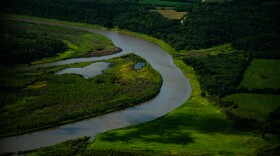-
The Polk County Board of Supervisors voted to support a network of water quality sensors in rivers and streams across Iowa. They hope other counties will follow suit to prevent a funding cliff next year.
-
Beaches at two dozen state parks and recreation areas had at least one "swimming not recommended" advisory this summer because of high E. coli levels. Years-long efforts at the Iowa DNR aim to pinpoint potential sources, better understand the health risks for beachgoers and find solutions.
-
Water: who controls it, who protects it and who decides its fate?
-
The editor and co-owner of the Storm Lake Times Pilot discusses his new book, Dear Marty, We Crapped In Our Nest: Notes from the Edge of the World.
-
A new report examines Iowa farmers’ awareness and opinions related to the state’s strategy to cut nutrient runoff in waterways. The majority support more conservation, but their numbers have softened over the last decade.
-
The Iowa Department of Natural Resources hosted a public meeting and hearing Wednesday on a wastewater permit amendment requested by Interstate Power and Light. Several environmental groups argue the draft permit allows Alliant Energy, the parent company, to bypass a federal law passed in 2024.
-
Iowa cities are receiving significant settlements from chemical companies to address "forever chemical" contamination in drinking water. But officials caution that the funds may not cover all associated costs, as long-term solutions remain uncertain.
-
Water restrictions for nearly a fifth of the Iowa’s population brought the state’s nitrate challenges to the forefront. Water quality experts say certain practices higher up in the watershed could make a difference if they are scaled up.
-
Scientists discussed pollution, bacteria and other challenges plaguing central Iowa's rivers at an event in Des Moines Monday. The presenters contributed to a two-year assessment of the Des Moines and Raccoon rivers, which includes recommendations at the local, regional and state level.
-
Nitrates, fecal bacteria, sediment and other pollutants in the Des Moines and Raccoon rivers threaten safe drinking water for 20% of the state’s population. That's one of the findings from a sweeping study commissioned by Polk County supervisors.
Play Live Radio
Next Up:
0:00
0:00
Available On Air Stations










